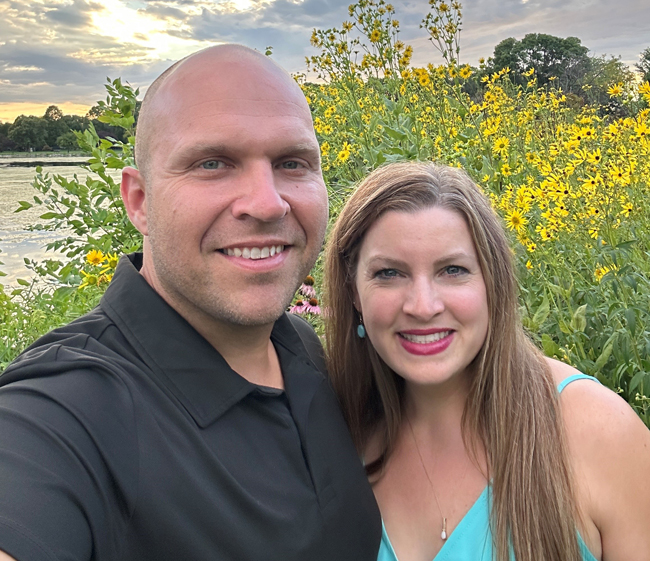Brittany Heard: For women to gain more power, we need to redefine it

BY BRITTANY HEARD, LEAD ADVISER, FOSTER GROUP INC.
I’m an introvert. Growing up, I was particularly shy and soft-spoken. Even though I was a good student and a good athlete, I lacked confidence. I was content to remain unnoticed. For years, I didn’t feel like this was a problem. It was just who I was – shy, quiet Brittany. I now know that many (most?) women, even those who are extroverts, are like me. They lack confidence.
At some point along the way, I realized my lack of confidence was a problem. I wanted to change. I also learned that confidence isn’t something you’re born with – it’s not that you either you have it or you don’t. It’s something that can be learned.
So, I started to get serious about growing in confidence. Five-year-old Brittany wouldn’t believe what 2024 Brittany is doing now: presenting to large groups, leading a women and wealth initiative in my workplace and confidently delivering financial advice to clients (both men and women!) who are double my age. At times, I step back and can hardly believe I’m the same person who, at one point, found it difficult to initiate a conversation with anyone.
Recently, I’ve started to think about the connection between confidence and power. Power is a characteristic typically associated with men. As a woman, I didn’t see myself as powerful and never thought about pursuing power. In addition, almost all of us, both men and women, have experienced the abuse of power. It’s painful. I had never really thought about power being necessary, good and something worthy of my attention. All of this changed when I read “The Power Code” by Katty Kay and Claire Shipman.
In “The Power Code,” Kay and Shipman describe the old view of power in this way: “Having power over a person or the ability to make people move or change.” Exactly! If this is what power is, I was not interested in having it. It felt particularly foreign to me as a woman. But Kay and Shipman provided a new definition of power. It’s a definition that not only makes sense to me as a woman but that, frankly, is a better way for all of us to think about what power is. Here is their definition:
Power is the ability to:
- Exercise our will – which leads to more joy.
- Have influence (not control) – which leads to less ego.
- Effect change – which leads to maximum impact.
Yes! This definition makes sense. It resonates with who I am and the work I do. Seen this way, power isn’t something to avoid. In fact, it sounds amazing and worth pursuing. Power can be used to make things better, not worse. I can exercise my will, influence those around me and create positive change. I want joy and not ego. I want to make an impact on my clients and colleagues. I’m not interested in control – forcing my clients to make this or that decision – but I am interested in using the power I have to nudge them to make good decisions on their own. I can use my power to help people make wise choices and positive changes in their life.
In addition, as a woman whose view of power has changed, I want to help other women change their view of power. So, what can I (or, rather, we) do to encourage more women to feel comfortable pursuing and using power at work? The following are practical ideas Kay and Shipman detail in the book:
- Women need to prioritize sharing our successes and achievements with our managers.
- Women need to support the women around us, saying things like “Let her finish” if we notice a woman being interrupted.
- We need to celebrate the wins of other women and champion them.
- We need to encourage women around us to try new things and push themselves out of their comfort zone. (I have been involved with a Toastmasters public speaking club for the past five years and have grown so much from pushing myself.)
If we can help women believe that using power is both acceptable and good, we are more likely to achieve gender diversity in key leadership areas. That’s a good thing for everyone.
Women don’t need encouragement only in the workplace, though. We need to be encouraged to use power in our family and home life. Why? Because women still spend more time doing housework and parenting even when both spouses work. Kay and Shipman put it bluntly: “In other words, men are happy to have a female partner who has an education, a career, and a salary, but they’re not happy to do more chores.” Here’s an interesting and sad fact. Though one-sixth of American women out-earn their husbands, most of them lie about it on U.S. Census forms (men and women). This has everything to do with outdated notions of what power is and who should have it.

Thankfully, neither I nor my husband, Erik, has ever been shy about telling others that I make more money than he does. He works in education, and I’m a financial planner. Both of us believe we are doing what we are made to do, and we understand there’s a difference in how we’re compensated. Additionally, my husband and I have done a good job of sharing the roles that make homes “go.” He cooks, goes grocery shopping, decorates and much more. He single-handedly did all the back-to-school shopping. I’m responsible for all finances. I also spend plenty of time cleaning, doing dishes and laundry. This hasn’t happened by accident. We’ve had many intentional conversations and are committed to sharing the load.
Frankly, without Erik taking on more than men have historically taken on in the home, I wouldn’t have been able to achieve what I have achieved at work. It’s not about being perfectly equitable, but about doing what each of us is best at and chipping in when the other person’s job is more demanding. If you feel there is an imbalance in your home, perhaps it’s time for a conversation. Use your power to initiate the conversation. Talk about what each of you will be responsible for around the house. Include things like mental work (making appointments, planning, etc.) in these discussions. And when the roles have been defined, don’t micromanage. Whether at work or in the home, no one likes to be micromanaged!
For women to gain more power, we need to redefine it. And once power is redefined, we need to encourage women to pursue and use it for good.
Please see important disclosure information at www.fostergrp.com/disclosures. A copy of our written disclosure brochure as set forth on Part 2A of form ADV is available at www.adviserinfo.sec.gov.


